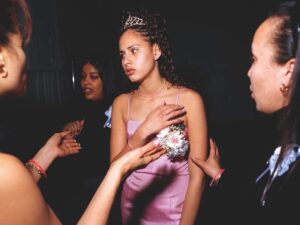This week, director and filmmaker Elsa Rosengren will present her final school year project in the Cannes Special Festival 2020.
Chosen as the Cinéfondation selection, she will compete amongst 17 other young talents, all recently graduated from film making academies and programs around the world. The Swedish filmmaker will be the only Berlin-based woman to present a movie at the Cannes Festival this year. We spoke with Elsa about her film « I Want To Return Return Return » and the inspirational impact that the German capital had on her work.

Can you explain to us the reason you found yourself in Berlin?
I didn’t have the idea or desire to become a filmmaker until I made my first film. I left Sweden at 19 with the opportunity to live in many different places. I made two very short but, for me, exciting films while studying in an art school in Rhode Island. After this, I felt like becoming a filmmaker and since then, I have been pursuing this decidedly. Making those first short films felt very right, exciting and promising.
And now your work is represented in the Cinéfondaton category. What does this nomination mean for you?
It meant when we received the email happiness and validation for everyone involved. After the nomination people get interested in what you do, I got emails from strangers and producers. That’s nice, but it has nothing to do with the development and pressure I experienced by the big the effort of making and finishing the film. My goal was to give all I had, so this is what I tried to do, even if I was scared of the results.
Your film is inspired by the Berlin way of life, more particularly in the Kreuzberg area. How is this city bringing you inspiration on a daily basis?
For me, living in Berlin has often been very lonely. I was a loner for many years. I didn’t attend the academy so much, was not going out much or meeting new people, or any social activity almost at all. Sounds horrible to me now but I enjoyed this state of loneliness, until at some point it became too much. When I began writing « I Want To Return Return Return » I was living a kind of isolated lifestyle. Casting the people who appear in the film was for me a way to get into the city. I was looking for people with depth and for something rich and exciting. Like an atmosphere worth capturing, and this atmosphere I think belongs to a Berlin which, as I perceive it, is vanishing along with the old Berliners who die or have to move away. The people in the film are stuck in a dreamy state where they don’t live fully, but fantasise with others who are similar. The people are stuck in their city, in their past, kind of stuck dreaming.

Any good locations in Berlin for our readers to go to get in the mindset of your film?
For me my film is like a calm nightmare. It’s normal life where something went wrong, where something vital is missing, or never happened when it should have happened. I suppose I would invite readers to go to Görlitzer Park if they want to feel something like that.
I was particularly intrigued by the imagery of the film, vintage and sepia-toned. How would you describe your style?
The colour of the film is yellow. Yellow to me to some degree looks like the past but mostly I think it gives the images a surreal kind of nightmare-feeling where reality seems slightly off. Calm and desperate at the same time. Our color grader Edmond Laccon called the look of the film ‘To Stand Cold in The Sun’ and ‘Despair at Sunset’. I think he says it really well. Cinematographer Giulia Schelhas had this vision of a yellow film in her head since the very beginning, I would not have come up with that myself, and I think it was a vital thing for the film, completely right.
What inspirations were the most important to you in this creative process?
I think inspiration is what you can’t avoid to address at a certain point in life, something like that.
What is the most meaningful part of your job?
Having a purpose in life.

What is your first memory of cinema?
What immediately came to me when you asked the question is a film I saw long ago and almost don’t remember, but it was about the great guitar player Paco De Lucia. He is a Flamenco guitar player. I just remember one part in the film, where he described listening to the radio, hearing a fantastic guitar player. Then Paco de Lucia realised that it was he himself who was playing that song on the radio, and then he couldn’t listen to it anymore.
Which directors do you look up to?
I like Werner Herzog a lot, because I feel a lot of life energy when I watch his films or listen to him speak. The biggest idol in my life is Bob Dylan for the same reasons.




